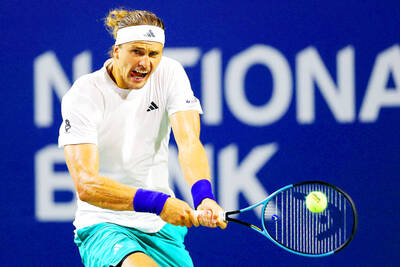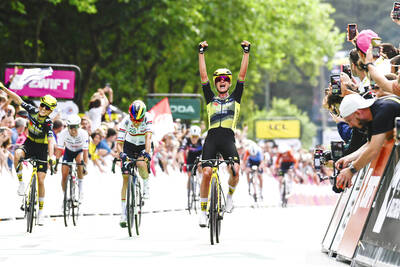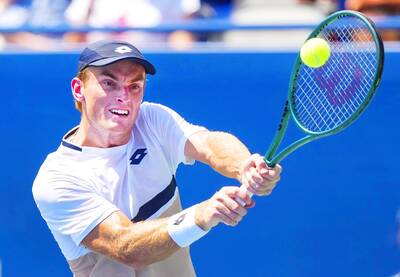All his life, Oscar Pistorius has had to battle adversity. Competing in the Beijing Olympics is a challenge the double-amputee runner may not be able to overcome.
The IAAF ruled on Monday that the South African is ineligible to compete in Beijing -- or any other sanctioned able-bodied competitions -- because his "Cheetah" racing blades are considered "technical aids" which give him a clear competitive advantage.
"An athlete using this prosthetic blade has a demonstrable mechanical advantage [more than 30 percent] when compared to someone not using the blade," the IAAF said.
The 21-year-old Pistorius had long learned not to consider his artificial legs a hindrance, even refusing to park his car in a spot for disabled people. Now the sport he learned to love as a teenager has thrown up a huge obstacle, just as he was making his name among the world's able-bodied athletes.
"That's a huge blow," said Pistorius' manager, Peet Van Zyl. "He has been competing in South African able-bodied competition for the past three years. At this stage it looks like he is out of any able-bodied event."
Van Zyl spoke briefly with Pistorius, saying he "could hear from his voice that he is disappointed."
Pistorius said last week he would appeal "to the highest levels" if the ruling went against him. He could take his case to the Court of Arbitration for Sport in Lausanne, Switzerland.
The International Olympic Committee said it "respects" the IAAF decision.
"This decision has nothing to do with Oscar Pistorius' athletic merits. What is important is to ensure fair competition," the IOC said in a statement.
South Africa's national athletics federation feels bound by the IAAF rules and must keep Pistorius out of some national races he has entered for several years.
"It rules him out with immediate effect. We use the IAAF rule book," South Africa federation president Leonard Chuene said. "If we had our rules and our own competition it would be easier. It is a huge problem."
Pistorius finished second in the 400m at the South African National Championships last year against able-bodied runners.
"It's unfortunate because he could have boosted team athletics at the Olympics," Chuene said.
The IAAF made its decision based on a study from German professor Gert-Peter Brueggemann, who found several indicators the Cheetah blades provided an unfair edge.
The federation said Pistorius had been allowed to compete in some able-bodied events until now because his case was so unique that such artificial protheses had not been properly studied.
"We did not have the science," IAAF spokesman Nick Davies said. "Now we have the science."
No one directly questioned the findings of Brueggemann. The producer of Pistorius' Cheetahs and the International Paralympic Committee said, though, that more tests should be undertaken before such a decision could be taken.
Considering the Olympics open less than seven months from now and that he still needs to run a qualifying time without having the right to compete in IAAF events further reduces the possibilities for Pistorius.
The ruling does not affect his eligibility for Paralympic events, in which he was a gold medalist in Athens in 2004.
The runner had worked with Brueggemann in Cologne for two days of testing in November to learn to what extent the J-shaped carbon-fiber extensions to his amputated legs differed from the legs of fully-abled runners.
Brueggemann found that Pistorius was able to run at the same speed as able-bodied runners on about a quarter less energy. He found that once the runners hit a certain stride, athletes with artificial limbs needed less additional energy than other athletes.
The professor found that the returned energy "from the prosthetic blade is close to three times higher than with the human ankle joint in maximum sprinting."
The IAAF adopted a rule last summer prohibiting the use of any "technical aids" deemed to give an athlete an advantage over another.
Pistorius has set world records in the 100m, 200m and 400m in Paralympic events.
Pistorius was born without fibulas -- the long, thin outer bone between the knee and ankle -- and was 11 months old when his legs were amputated below the knee.
He began running competitively four years ago to treat a rugby injury, and nine months later won the 200m at the 2004 Paralympic Games in Athens.
Pistorius competed in the 400m at two international-level able-bodied meets last year. He finished second in a B race in 46.90 seconds at the Golden League meet in Rome on July 13 and, two days later, was disqualified for running out of his lane in Sheffield, England.

The 2025 International Federation of Bodybuilding and Fitness (IFBB) Mr Universe Chinese Taipei competition began yesterday at Xinzhuang Gymnasium in New Taipei City, with more than 150 athletes showcasing their physiques. It is the first time in 16 years that the IFBB has held a competition in Taiwan, the last being the 2009 World Games in Kaohsiung. The professional bodybuilding contest is bringing together athletes from Taiwan and 16 other countries, including Malaysia, Japan, the US, France and Mexico. IFBB Chinese Taipei president Hsu An-chin said in an interview yesterday that the event came to Taiwan thanks to his lobbying efforts at last

Top seeds Alexander Zverev of Germany and American Coco Gauff on Tuesday advanced to the third round of the Canadian Open after both players were pushed hard by their opponents. World No. 3 Zverev, playing in his first match since his first-round loss at Wimbledon, was far from his best, but emerged with a 7-6 (8/6), 6-4 win over Adam Walton under the lights in Toronto. Momentum shifted firmly in Zverev’s favor when he won a 52-shot rally in the first set tiebreak and he sealed the win on a double fault by the Australian in the second set. “It was a very

Cycling great Marianne Vos won the opening stage of the women’s Tour de France with a brilliant late attack on Saturday. The 38-year-old Dutchwoman overtook her Visma–Lease a Bike teammate Pauline Ferrand-Prevot approaching the line, and then held off Mauritian rider Kim Le Court in the closing meters of a grueling uphill finish. Ferrand-Prevot looked set to win the stage, but the Frenchwoman attacked too early from 600m and could not withstand the late surge from Vos, who punched the air with her left fist as she crossed the line. Moments later, Vos hugged an exhausted-looking Ferrand-Prevot, the Paris-Roubaix winner. “I didn’t know if

TAIWANESE EXITS: Fellow Australian Christopher O’Connell joined Tristan Schoolkate as a winner following his 6-1, 6-2 defeat of Tseng Hsin-chun Australian qualifier Tristan Schoolkate on Monday dispatched rising Brazilian talent Joao Fonseca 7-6 (7/5), 6-4 at the ATP Toronto Masters, ensuring a breakthrough into the world top 100. The 24-year-old from Perth moved to 98th in the ongoing live rankings as he claimed his biggest career victory by knocking out the ATP NextGen champion from November last year. Schoolkate, son of a tennis coach, won his first match over a top-50 opponent on his sixth attempt as he ousted the world No. 49 teenager from Brazil. The qualifier played a quarter-final this month in Los Cabos and won through qualifying for his